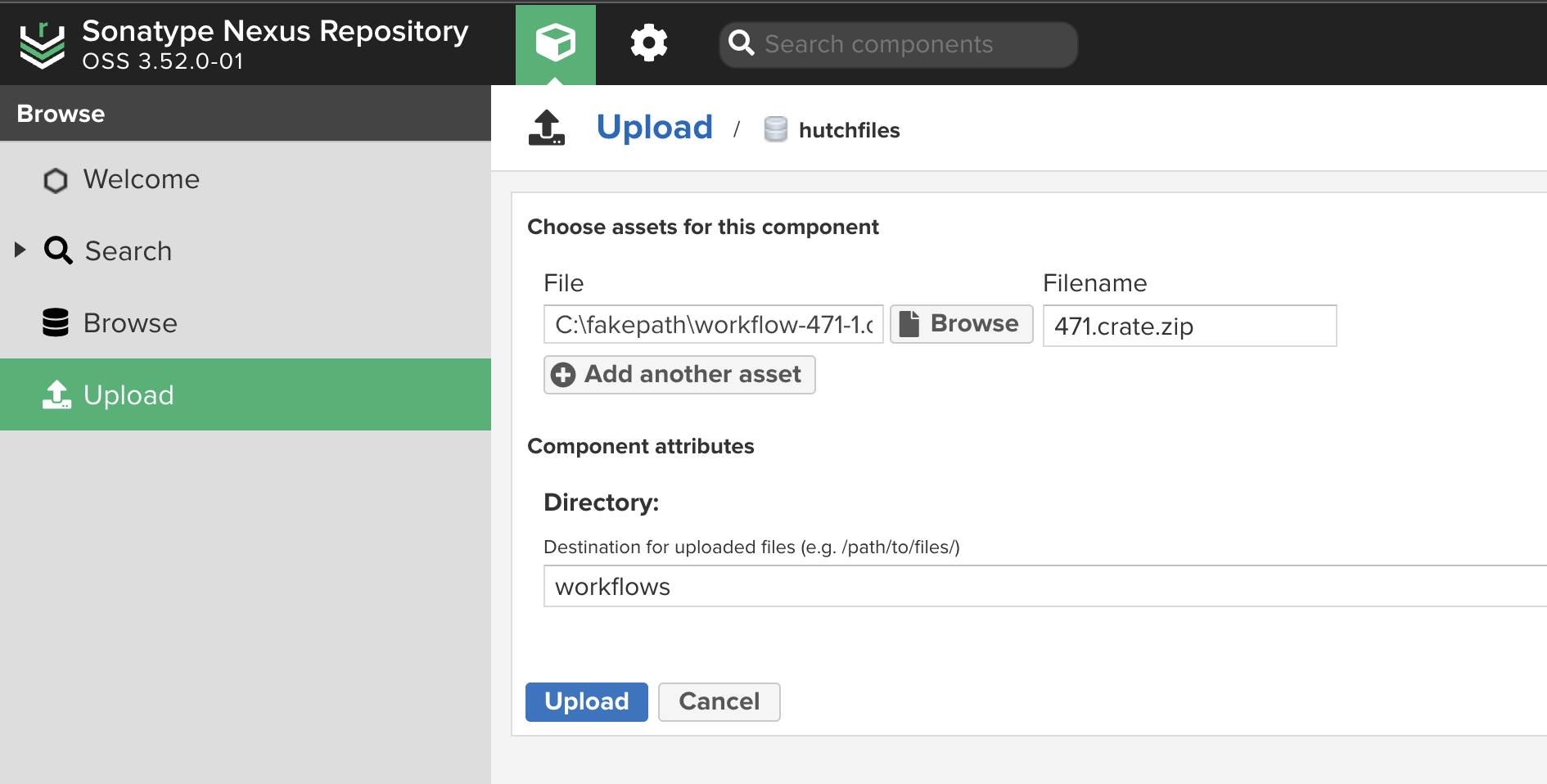WorkflowHub in a TRE
This page assumes you are using Ubuntu Linux as your OS and that you will have root or sudo privileges.
When running Hutch in a secure environment with no internet access, you will need to redirect links to some external resources to your internal equivalents. This page will explain how to set up a WorkflowHub alternative using Sonatype Nexus as the store.
Nexus workflow store
Hutch comes with a docker-compose service to run an instance Nexus. This service runs its web portal on port 8081. You can view it by navigating to your-host:8081 in your web browser, where your-host is the IP address or domain name of the machine being used to run Hutch.
Creating a file store on Nexus
Create a file store on your Nexus instance called hutchfiles following these instructions.
Upload trusted workflows to Nexus
Navigate to the upload page for hutchfiles on your Nexus instance and upload the workflow files. WorkflowHub workflows have numeric IDs (1, 2, 3, ...) which are found in their URLs on WorkflowHub. Let's name the workflows like id.crate.zip, e.g. 123.crate.zip and save them to the workflows directory under hutchfiles.

WorkflowHub
Re-routing traffic to localhost
To redirect traffic to WorkflowHub to localhost / 127.0.0.1, edit your /etc/hosts file by adding the following:
# Redirect WorkflowHub traffic
127.0.0.1 workflowhub.eu
Trust issues
To get Hutch to trust calls to the redirected traffic, you need to generate a self-signed SSL certificate and add it to your machine's trust store. Perform the following steps in the home directory of the user running Hutch, e.g. /home/foo.
- Generate the certificate.
openssl req -x509 -newkey rsa:4096 -keyout key.pem -out cert.crt -sha256 -days 365
You will be asked for some information about your organisation etc. Most of this can be left blank except for the "Common Name" which must be set to workflowhub.eu.
- Decrypt your private key.
openssl rsa -in key.pem -out new-key.pem && mv new-key.pem key.pem
- Add the certificate to trust store.
cp cert.crt /usr/share/ca-certificates/cert.crt
This command should be executed as root.
- Activate the new certificate.
dpkg-reconfigure ca-certificates
This command should be executed as root.
Re-routing to the workflow store
When your workflow looks for, say, https://workflowhub.eu/workflows/488/ro_crate?version=2, the changes in /etc/hosts will redirect the traffic to your local machine. We will use Nginx to look up the workflow on our Nexus instance and serve it back to us. In the example nginx.conf file below, the first location block, matches tries to match the WorkflowHub URL and strip out the relevant workflow ID. It then proxies to the Nexus instance, which serves back the file.
This example nginx.conf file can be used with the docker-compose.yml file in the Hutch repo. Copy the text below into a file called nginx.conf into the home directory of the user running Hutch, e.g. /home/foo/nginx.conf. It should be next to key.pem and cert.crt from the previous section. You do not need to modify this example code. It is designed to work with the nginx service in the docker-compose.yml file.
# nginx.conf
events {
worker_connections 1024;
}
http {
server {
listen 443 ssl;
ssl_certificate /etc/nginx/cert.crt;
ssl_certificate_key /etc/nginx/key.pem;
# capture workflow ID and redirect the internal store
location ~ ^\/workflows\/([0-9]+)\/ro_crate$ {
proxy_pass http://nexus:8081/repository/hutchfiles/workflows/$1.crate.zip;
}
# root location must be defined for the set up to work
location / {
proxy_pass http://nexus:8081/service/rest/repository/browse/hutchfiles/;
}
}
}